- Home
- Pat Conroy
My Reading Life Page 4
My Reading Life Read online
Page 4
“A Cherokee rose, not just a rose. A swallowtail butterfly, not just a butterfly. That kind of thing,” he said. “Get the details right. Always the details.”
I followed him down another path, which led to the edge of the marsh and the great, vast reaches of the Santee River. He told me that his ancestors had been entertaining Francis Marion, the famous Swamp Fox whose tactics in guerrilla warfare had flummoxed the English troops, when a patrol of British cavalry arrived at the plantation’s front entrance. The Swamp Fox had sprinted out the back door and made his escape by swimming the Santee River, then hiding in the attic of another plantation upriver. Hampton Plantation had played a small but necessary role in the revolution that cleansed the country of British rule. With a sweeping gesture of his hand, he informed me that he and his wife did not really own Hampton Plantation, but they were lucky enough to walk the world as “visitors” to such a distinguished home place.
“We are visitors in every house we ever enter, Mr. Conroy,” he said. “It’s important that you remember that when you begin to write. And don’t forget you were once a visitor to Hampton Plantation, just as I am.”
“I’ll never forget it, sir,” I said.
On our drive back through Charleston, Gene asked me how I liked Archibald Rutledge. I admitted that I was unprepared to meet such an important man and could hardly believe that he had spent so much time with me and seemed so unhurried as he answered my foolish, boyish questions. I told Gene that Archibald Rutledge had told me about the definitive value of details; then I described the path where Francis Marion had escaped the British cavalry patrol. I spoke of camellia bushes ten feet high and the color of ink Mr. Rutledge used to write his poems and that his ancestors had built the plantation in 1735.
“You didn’t learn the most important thing,” Gene said. “I thought there was more to you. Substance, that kind of thing. I gave you credit for having a substance you don’t.”
“What’re you talking about?”
“Here’s what you should’ve learned, but you didn’t. Now you know how to treat a young boy or girl who wants to be a writer. If, by a miracle, you become a writer, Archibald Rutledge just showed you how a famous writer treats a no-account sixteen-year-old boy who’s got the same dreams he did as a kid.”
“If I ever get to be a writer, Mr. Norris, I’ll be nice to every kid I meet. That’s a promise.”
It was a throwaway pledge I made in the giddiness of having just met a working poet for the first time, but Gene Norris would never let me forget it. Over the years, when a resourceful high school student was writing a report on one of my books, Mr. Norris became the primary source for getting in touch with me. He threw that day at Hampton Plantation and my visit with Archibald Rutledge in my face for the rest of his life.
“Norris, Norris, please listen to me,” I would whine. “I’ve got books to write. I’ve got kids in college. When will my debt to you be stamped ‘paid in full’?”
“This little girl from Laurens is seventeen, a lovely, darling girl, bright as a penny made in Denver. She’s doing a paper on The Prince of Tides. I told her you’d call her tomorrow night.”
“You can’t do this, Gene. You just can’t do it.”
“I seem to remember a sixteen-year-old boy. He was in my class over thirty years ago. He sure would’ve liked to talk to a real writer. It seems I took him to meet a Mr. Archibald Rutledge, who was sure nice to that snot-nosed boy.”
“What’s the damn telephone number, Norris?”
So, over the years, I would call the girl in Laurens or the sweetheart of a boy from Prosperity or the cheerleader from Spartanburg or the drum major from Conway. South Carolina is a state of contained, unshared intimacies. It is a state of crosscurrents, passwords, secret handshakes, but it rewards the lifelong curiosity of both natives and strangers alike. When I called an honor student in Orangeburg, I would touch down into the lives of fifty families who loved that child and every English class in that high school. I never called a kid who found me through the good offices of Gene Norris who was not scrupulously prepared, inquisitive, and nimble-footed. Their questions were so refined that I couldn’t get off the phone in less than an hour. Some of them confessed that my great English teacher had spent several phone calls making sure that they were well equipped for their interviews with me. All of them were appreciative and grateful for my time, but I could tell that every one of them was nuts over Gene Norris.
After Christmas of my junior year, Gene put me in charge of selling paperback books from display racks on the right side of his desk. The bookstore in town sold mostly office supplies, so Gene found it easier to order books wholesale from publishing companies to make sure that his students had access to the great literature of our times. I opened the store at lunchtime and sold books to any student who wanted to buy them. I gained a reputation among the jocks for knowing the shortest works of literature ever written by accomplished writers. I had fullbacks reading Steinbeck’s Of Mice and Men, the offensive line reading Orwell’s Animal Farm, and the whole track team dashing through Hemingway’s Old Man and the Sea. But the high school had a passel of bright, ambitious kids who would one day walk the halls of Harvard, Princeton, Stanford, and other schools of that reputation. I sold two Moby Dicks, a handful of Scarlet Letters, a bunch of Great Gatsbys with a couple of Cather’s Death Comes for the Archbishops, and Booker T. Washington’s Up from Slavery.
But the most popular book I sold that season could not be displayed or sold without due diligence or Mr. Norris’s personal permission. Gene Norris had championed The Catcher in the Rye since its publication, but he had a heartfelt talk with every student who bought it and explained its incendiary and controversial reputation. Because it was sold as contraband and because there is no taste so ambrosial as forbidden fruit, The Catcher in the Rye was the runaway best seller during my time as a salesman in Gene Norris’s class. The purchase of The Catcher in the Rye felt like a revolutionary act during those years of gathering disturbance in the Southern psyche. When I wrote a book report on it, I drew a huge laugh from Mr. Norris by declaring that any high school student who failed to identify with Holden Caulfield was a worthless loser or a pathetic brownnoser. But Catcher in the Rye had a way of snake-biting even its most dexterous handlers, and Gene was called before the school board to answer the bitter complaints of parents who thought he was in the business of corrupting the innocence of their children.
When Gene prepared to confront the school board—a test he welcomed—he asked me to write a summation and defense of the novel from a high school student’s point of view. I worked on the paper for a week, but lived in fear that I would damage Mr. Norris’s reputation if I said what I was really thinking. I wrote something cowardly and milquetoasty, and Gene Norris would have nothing to do with it. Instead of scolding me or holding me up to ridicule, he approached it as a great teacher must and delivered a lesson I would take with me for the rest of my life.
“Pat, you’re not saying what’s in your heart. You write as though you’re afraid of something. But our work here is literature. Nothing more or less. Literature tells us to be brave. It demands it of us. We are fighting so that Holden Caulfield’s voice can be heard. If they silence him who is next? Will it be Hester Prynne or Ishmael or Eugene Gant, your new favorite? You say you wrote this paper, but it’s somebody else, somebody you think you’re supposed to be. It’s not the boy I know you to be.”
“I can make it better, Mr. Norris.”
“I know you can,” he said. “But you need some help from your teacher. Go back and write it. But don’t do it the same way. The next time write it like Holden Caulfield would write it. Come out swinging. Do it for Holden. Do it for you and for me.”
In a white heat, I wrote my defense of The Catcher in the Rye using the wisecracking, disconsolate voice of Holden Caulfield. I wrote it in one fiery take. When Mr. Norris read it the next day, he whistled and laughed and groaned. “You’ll get both of us run out of town. We
’ll be strung up by a posse in the train yards of Yemassee. Boy, this is way too hot to handle. It’s perfect. I wouldn’t let you change a word of it.”
When Gene Norris went before the school board to defend his teaching of The Catcher in the Rye, I was in the audience holding tight to my own intemperate apologies for the novel. The world of adults both appalled and intimidated me, but I found myself pacified by the eloquence of my English teacher. He talked about the things literature could do and not do, but he believed that a great book could do whatever it wanted. He reminded the school board that neither the parents who condemned the Salinger book nor any board member had bothered to read it. Great books invited argument and disagreement, but ignorance did not even earn a place at the table when ideas were the subject of dispute. Gene told the group that he would stake his reputation on the integrity of Catcher in the Rye as a novel. In his heart, he believed that the portrait of Holden Caulfield was the most authentic rendition of a modern-day teenager in American fiction. If they wanted to ban one of Gene’s choices, then the board of education should go ahead and banish all of them, because books existed to force people to examine every facet of their lives and beliefs. Because of the power of its ideas, the Bible was banned in the Soviet Union. There was nothing to fear in The Catcher in the Rye except the danger of its being censored by people who hadn’t read it. Mr. Norris’s passion and his common sense won the hearts of the school board, and Holden Caulfield walked the streets of Beaufort as a free man from that day forward.
When Mr. Norris drove me home that night, I was giddy with a free-flowing sense of triumph. I was also grateful that I’d not been called on to address the school board. The atmosphere seemed inimical to anything a kid might have to say.
“Oh, I’d never have called on you to deliver your paper, scalawag,” Gene said.
“Why not?”
“Because they’d have fired me on the spot. Too hot to handle.”
“Then why’d you have me write it?” I asked.
“To see what you really thought. You hide everything about yourself. We’ve got to change that, son.”
One Sunday each month, Mr. Norris would pick me up at our family’s quarters in base housing and drive me over to St. Helena Island for the community sing at the Penn Center. Quaker activists had formed the Penn School in the middle of the Civil War as a testing ground in teaching the newly freed slaves in what was called the Port Royal Experiment. Always, Gene and I were usually the only white people in the hall where the black islanders would gather to sing the spirituals that fortified and sustained their ancestors during the harrowing time of slavery. Their voices lifted up in the dark melancholy of history, the shine of mahogany blending with the density of wood smoke as the voices discovered a stirring, perfect harmony. I can still sing the words of the first spiritual I ever heard at Penn Center.
The ole sheep done know the road,
The young lambs must find the way.
The singing carried with it an authenticity that seemed beyond criticism to me. Though these were the sons and daughters of slaves, they were keeping alive the songs that kept their ancestors hopeful during the tearful nights of their captivity. I was listening to the heart of Africa beating the dream of liberation on a sea island that had welcomed them in chains. Often, Gene and I would drift across the street to the home of Courtney and Elizabeth Siceloff, the white Quaker couple who ran the center and who knew most of the black leadership in Beaufort years before anyone else did. Besides my mother, Gene Norris was the first white Southerner I knew who was a sworn enemy of segregation and the Jim Crow laws.
One Sunday after the community sing, a young Martin Luther King Jr. got up to preach a homily, and I heard the most electrifying speaker I had ever listened to. His voice was an instrument of an immense and subtle power. He spoke without notes, his voice both a spillage of honey and a quiet call to arms. Later, I met him at the Siceloffs’ house and learned that he, his family, and colleagues often retreated to Penn Center to plan the next phase of the civil rights movement. When a photographer began snapping pictures of the gathering, I kept watching as Mr. Norris went to his knees to tie his shoes. The third time I saw him go down to lace up his troublesome shoe, I bent down and offered to show him how to tie a double knot. He went on tying his shoe as he whispered to me, “If a photograph of me socializing with Dr. King ever gets in the Beaufort Gazette, I’ll be run out of this town on a rail. Whenever you see that man aiming his camera at me, I’ll know my shoes are untied.” Later I would watch Dr. King in serious discussion with Gene Norris, and I was one of the few people in Beaufort County to know that a rare friendship had sprung up between them.
Gene Norris didn’t just make his students love books; he made us love the entire world. He was the essential man in the lives of a thousand boys and girls who dwelled in the shadow of his almost unnoticeable greatness. When Mike Sargent’s father was killed in Vietnam, Mike barely knew Mr. Norris when Gene appeared on his doorstep to offer his condolences. Mike was a wisecracking, rebellious boy, and Gene always reserved a tenderhearted place for the bad boys. Although Mike’s relationship with his father had been violent and bitter, he was devastated by his father’s death and the fact that he could never be reconciled with him. Gene Norris did not leave Mike Sargent’s house for the next three days and nights. After the funeral in the National Cemetery, Gene stepped in to replace the father forever AWOL in Mike Sargent’s life. Mike would’ve killed anybody who harmed Gene, and everyone in Beaufort knew it. Yet Mike never took a course Mr. Norris taught.
In 1994, I returned limping to Beaufort after my train wreck of a second marriage had fallen apart. In the middle of writing Beach Music I had collapsed from the inside out and was more suicidal than I’d ever been. By killing myself, I could rescue my soul from an agony I could not even touch in my writing. Gene Norris drove out to my house on Fripp Island and ordered me to call my former shrink, Marion O’Neill, who had relocated her office from Atlanta to Hilton Head Island. From our first session, Marion thought I was closer to suicide than any patient she had ever treated. It alarmed her, and she and Gene talked on an almost daily basis during those first couple of weeks. Before I left the office on the first day, Marion said, “Pat, you’ve got to promise me one thing. You’ve got to promise me that you won’t kill yourself. If the author of Prince of Tides kills himself while he is my patient, you’ll destroy my practice.”
I laughed as she knew I would; then Marion commanded me to drive from there to Gene Norris’s office. “Sit and talk with Gene for half an hour,” she said. “Then drive yourself home. Gene’s going to call me after you leave him. You call me when you arrive home.”
Each day I would stop by Gene’s office at Robert Smalls Junior High, where Gene taught the last fifteen years of his career, helping run the guidance department. I would sit in his office and sometimes weep during our entire time together. He was solicitous and kind. As always, he was Norris-like. As the therapy began to kick in and I started to fight my way back into myself, I got to watch Gene deal with several black students with disciplinary or emotional problems. Not surprisingly, he brought extraordinary gifts to the task at hand. His dedication to his kids and their hero worship of him was a powerful force that rose up among them.
One day, I walked into Gene’s office as school was ending, and five black kids impatiently awaited my arrival. Gene motioned for me to follow him; we piled into his Buick and drove to the Highway Department. Gene led his kids into the building and stood in line with them as they received the handbooks they would need to master before they got learner’s permits. On the long drive home, Gene made all of his kids study the handbook, promising to take them all back when they had memorized the basics of driving. I was there when all five of them flunked their first exams. Gene went over their incorrect answers and discussed their mistakes and errors with them. I went back a second time and still no one passed. On the third try, one little kid from the community of Sheldon passed the test
with a perfect score. A loud cheer went up from our gang as we waited for the kid to get his learner’s permit.
When we walked to the car for the long drive home, Gene threw the kid his car keys and said, “You’re the driver now, Deontay. According to South Carolina law, you got the stuff to get us home. Prove it.”
As I sat in the backseat, with four middle schoolers moaning with envy, Gene carefully guided the young man on back roads that took us to his home without encountering much traffic. When Deontay turned off onto the dirt road where he lived, Gene leaned over and began tooting the horn on his Buick, causing people to come out of a dozen trailers to see what all the commotion was. At the end of the road, Gene spun the steering wheel and turned the car around and ordered the kid to become a little sassy and show-offy when he passed in review in front of his friends and family again. They cheered hard when the newest driver in the neighborhood flashed by them in his teacher’s Buick.
When the car stopped and the boy jumped out, he went racing into his mother’s arms. Then he turned and cried, “Thank you, Mr. Norris.” He grabbed Gene and kissed him. So did the mother. The father. The neighbors who were running up the road to join the impromptu party.
When Gene resumed driving, he said to the other kids, “Same day next week. You kids got to study hard. You just saw what good study habits did for Deontay. We’re going to make your families just as proud. Now, study, gentlemen. Study hard. I taught Mr. Conroy this and now I’m teaching it to you. Reading is the key to everything. Right, Tyrone?”
Though I was still shell-shocked and delusional from my latest skirmish with the demons that had trailed me back home, I remember thinking as I stared at Gene Norris, Where do such men come from? Why aren’t there more of them?

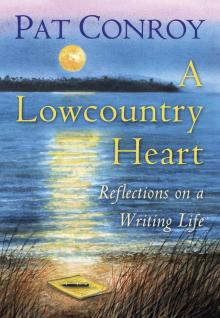 A Lowcountry Heart: Reflections on a Writing Life
A Lowcountry Heart: Reflections on a Writing Life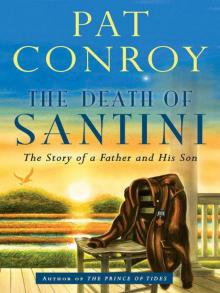 The Death of Santini: The Story of a Father and His Son
The Death of Santini: The Story of a Father and His Son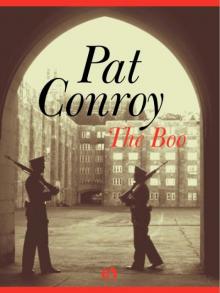 The Boo
The Boo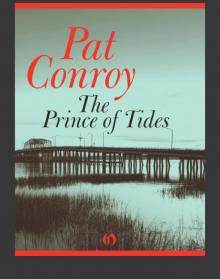 The Prince of Tides
The Prince of Tides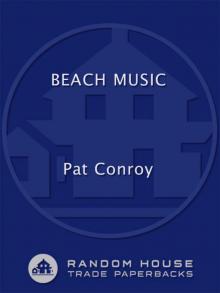 Beach Music
Beach Music The Water Is Wide
The Water Is Wide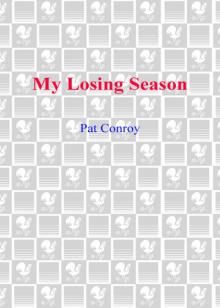 My Losing Season
My Losing Season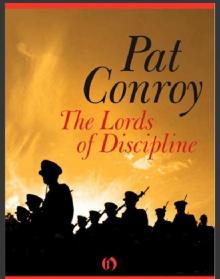 The Lords of Discipline
The Lords of Discipline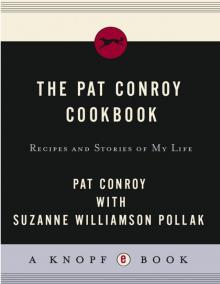 Pat Conroy Cookbook
Pat Conroy Cookbook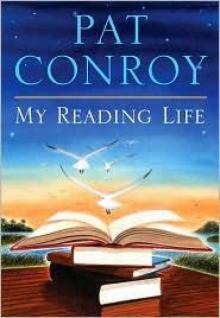 My Reading Life
My Reading Life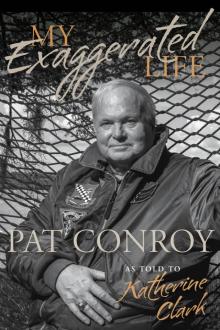 My Exaggerated Life
My Exaggerated Life The Pat Conroy Cookbook
The Pat Conroy Cookbook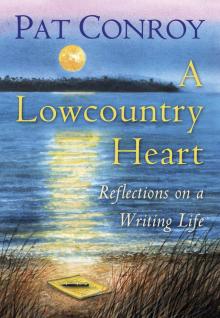 A Lowcountry Heart
A Lowcountry Heart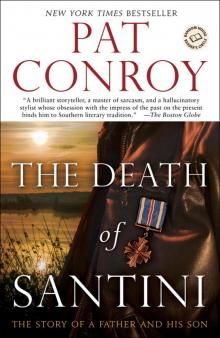 The Death of Santini
The Death of Santini